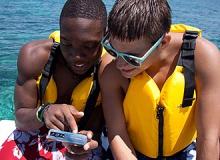Shark Research and Conservation Program (SRC)
Impact
The Shark Research Conservation program gives young people in Miami, Florida inspiring, hands-on science experiences unlike any other. In 2013, for example, it brought more than 1,100 young adults on 71 trips to do actual field research on sharks and marine biology, With sufficient funds, some 3,000 more young people could , and many more youth could benefit from virtual expeditions, school visits, and teaching materials for schools..
Accomplished
- Need Accomplished
- Evaluation Developing
- Sustainability Accomplished
- Replication & Scalability Developing
- Partnerships Accomplished
- Capacity Developing
- Challenging & Relevant Content Accomplished
- STEM Practices Accomplished
- Inspiration Accomplished
- Under-Represented Groups Accomplished

Design Principles
The programs in this database clear a high bar. STEMworks reviewed each program against the Design Principles for Effective STEM Philanthropy. Programs must be Accomplished () across all Design Principles, or be Developing (
) in a maximum of three areas.
Overarching Principles
-
Need Accomplished
Identify and target a compelling and well-defined need.
-
Evaluation Developing
Use rigorous evaluation to continuously measure and inform progress towards the compelling need identified.
-
Sustainability Accomplished
Ensure work is sustainable.
-
Replication & Scalability Developing
Demonstrate replicability and scalability.
-
Partnerships Accomplished
Create high impact partnerships.
-
Capacity Developing
Ensure organizational capacity to achieve goals.
STEM Principles
-
Challenging & Relevant Content Accomplished
Offer challenging and relevant STEM content for the target audience.
-
STEM Practices Accomplished
Incorporate and encourage STEM practices.
-
Inspiration Accomplished
Inspire interest and engagement in STEM.
-
Under-Represented Groups Accomplished
Identify and address the needs of under-represented groups.
Program Overview
The SRC program gives high school students exhilarating hands-on research experiences in marine biology. The Program helps students actively grow as scientists while supporting ongoing research crucial to shark conservation. The goals of the Shark Research Conservation program are: (1) to provide high school students with engaging scientific research opportunities that inspire youth to learn STEM skills and (2) to foster development of marine conservation stewardship, attitudes, and behaviors. In addition to the actual shark field-research expeditions attended by students, teachers implement a custom-designed online curriculum that conforms to Florida State standards in STEM. Online resources include a virtual shark-tagging experience to prepare students for field research. University of Miami graduate students also visit classrooms to prepare students for the expedition by working with teachers to implement curriculum and train students in data collection.
Funders and Partners
The Rosenstiel School of Marine & Atmospheric Science, UMiami; The Leonard and Jayne Abess Center for Ecosystem Science and Policy, UMiami; Batchelor Foundation, Inc.; Disney Wildlife Conservation Fund; Wells Fargo; National Geographic Society; Biscayne National Park; Everglades National Park